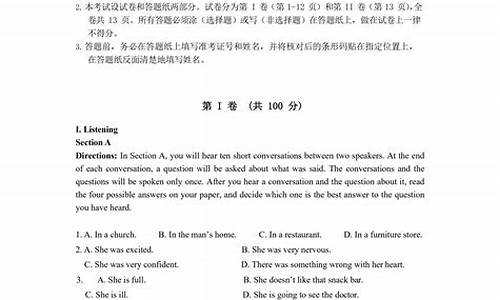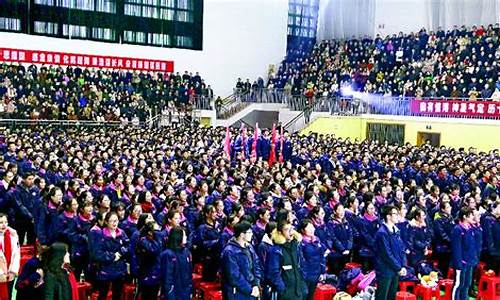2017年英语高考卷_2017高考英语卷子甘肃
1.甘肃高考状元考了多少分?
2.2017届全国100所名校最新高考模拟示范卷英语卷二的答案,谢谢,跪求
3.2017年高考使用全国统一卷的省份有多少
4.高考英语阅读理解训练附答案
5.2017年高考试题全国各个省试题都一样吗

高考英语阅读理解精品训练2017
近几年高考英语阅读主要有猜测词义、理解主旨大意、推理判断、对文章的细节理解、 数据推算等几种题型。为了帮助大家备考高考英语阅读理解题,我分享了一些高考英语阅读理解练习,希望能对大家有所帮助!
阅读理解练习1
Not many years ago, a wealthy and rather strange old man named Johnson lived alone in a village in the south of England. He had made a lot of money in trading with foreign countries. When he was seventy?five, he gave ? 12,000 to the village school to buy land and equipment (设备) for a children?s playground.
As a result of his kindness, many people came to visit him. Among them was a newspaperman. During their talk, Johnson remarked that he was seventy-five and expected to live to be a hundred. The newspaperman asked him how he managed to be healthy at seventy?five. Johnson had a sense of humour (幽默). He liked whisky (威士忌酒) and drank some each day. ?I have an injection (注射) in my neck each evening.?he told the newspaperman, thinking of his evening glass of whisky.
The newspaperman did not understand what Johnson meant. In his newspaper he reported that Johnson was seventy?five and had a daily injection in his neck. Within a week Johnson received thousands of letters from all over Britain, asking him for the secret of his daily injection.
1. Johnson became a rich man through
A. doing business. B. making whisky. C. cheating. D. buying and selling land.
2. The gift of money to the school suggests that Johnson
A. had no children. B. was a strange man.
C. was very fond of children. D. wanted people to know how rich he was.
3. Many people wrote to Johnson to find out
A. what kind of whisky he had. B. how to live longer.
C. how to become wealthy. D. in which part of the neck to have an injection.
4. The newspaperman
A. should have reported what Johnson had told him.
B. shouldn?t have asked Johnson what injection he had.
C. was eager to live a long life.
D. should have found out what Johnson really meant.
5. When Johnson said he had an injection in his neck each evening, he really meant that
A. he liked drinking a glass of whisky in the evening.
B. he needed an injection in the neck.
C. a daily injection in the evening would make him sleep well.
D. there was something wrong with his neck.
阅读理解练习2?I?m very tired from working here,?said Jean to her friend Kate,? I?m on my feet from morning to night. For the first quarter of the day, I clean up the counter (柜台) and set the tables. For the next quarter, I help in the kitchen. For the second half of my workday, I take orders at the counters.?
?Kate, I wish I had your job,?Jean went on. ?For four hours you just sit at the cash register (收款台) taking in money.?
?But I spend two more hours in the kitchen (厨房) than you do,?said Kate. ?It?s tiring to cook over a hot stove. I don?t think you?d really want my job. In fact, I?d like your job.?
1. Both Jean and Kate probably work in a
A. hotel B. library C. lab D. shop
2. How long did they work every day?
A. eight hours B. twelve hours. C. Ten hours D. Nine hours
3. How long did Kate spend in the kitchen?
A. a quarter day. B. A half day. C. One-third day. D. Three-fourths day.
4. From this passage we can see that
A. they are both interested in their work. B. their work is neither tiring nor busy.
C. both of them are tired of their work. D. they?ve decided to give up their work.
5. Give a proper proverb (谚语) to Jean and Kate.
A. It?s never too late to learn.
B. It?s no use crying over spilt milk.
C. The grass is always greener on the other side.
D. One swallow(燕子) does not make a summer.
阅读理解练习3In 1985 a French television company sent its reporters to the Paris Metro. They took cameras to see what passengers would do if they saw someone attached on the platform or in the trains. They acted out incidents. The incidents looked real but they were all done with the help of actors. However, very few people tried to help, and most passengers pretended not to notice. in one incident, a foreigner was attacked by three men. The attack was on a train which was quite full, and although one man tried to get the passengers to help, they all refused. It seems that such behaviour(行为) is not unusual, but the question is why? Is it a problem of big cities, or would the same thing happen anywhere? To discuss these questions, we have in the studio(演播室) Professor Wilson, who is an expert on the subject?
1. Who did the experiment?
A. A French television company. B. The Paris Metro.
C. The City Government of Paris. D. Professor Wilson.
2. What did the experiment try to find out?
A. How a foreigner was attacked on the train.
B. How passengers helped each other on the platform.
C. Passengers? reactions towards incidents.
D. Actors? performances during incidents.
3. What was the finding of the experiment?
A. Passengers helped a lot during incidents.
B. Very few foreigners were on the train.
C. Very few passengers tried to help during incidents.
D. Some people were good at acting on the train.
4. Who do the underlined words one man refer to?
A. One of the three men who attacked a foreigner.
B. One of the actors who took part in the experiment.
C. One of the passengers who were on the train.
D. One of the reporters who were sent to the Paris Metro.
参考答案:
1A 2 C 3 D 4 D 5 A
1A 2 A 3 B 4 C 5 C
1D 2 C 3 C 4 B
;甘肃高考状元考了多少分?
一、。 1.A 2.C 3.A 4. B 5. D
二、 1. Have you ever swum 2. he hasn’t visited 3. hasn’t won any prizes 4. I’ve alwayswanted to help you 5. has already invite us to travel 三、 1. It’s over 550metres. 2. To take in thebreath-taking view. 3. By rotating once every 72 minutes. 4. Three. / 3. 5. Some information about the CN Tower.
四、。 1.D 2.B 3.D 4.A 5.B 6.B 7.D 8.A 9.B 10.B
五、
Dear Tony, How are you? I’m having a wonderful timein Beijing now. I have done many interesting things here. I have been to manyplaces of interest. I have visited the Tian’anmen Square, the Palace Museumand the Great Wall. I have taken many nice photos of these famous places. I’llsend some to you with this email. I have also enjoyed different kinds ofChinese food. I’ve tried dumplings, noodles and roast duck. They are all verydelicious. I think Beijing is one of the biggest and busiestcities in the world. There’s a lot to see and do here. I hope we can visit Beijing together nexttime. Yours, Tom
2017届全国100所名校最新高考模拟示范卷英语卷二的答案,谢谢,跪求
2017年甘肃省高考文科状元是熊诗楠,总分654分,而理科状元则是肖智文和田野,总分都是691分。
2017年高考,甘肃理工类600分以上1121人(2016年为2332人),最高分691分(2016年最高分691分);文史类600分以上134人(2016年为70人),最高分为654分(2016年为638分)
2017高考理科状元:今年有两位学子高中理科“状元”,一名是肖智文,691分,来自兰州一中;另一名是田野,也是691分,来自西北师大附中。
2017高考文科状元:熊诗楠:熊诗楠来自师大附中,总分654分。语文124分,数学147分,文综242分,英语141分。
再来看看历年来湖北高考文科状元分数对比吧!
2016年甘肃高考文科状元:白银十中李晓彤638分
2016年甘肃高考理科状元:师大附中鸿宇班胡明源和王晴宜、通渭一中范璐690分并列理科状元
2016年甘肃高考文科状元:西北师大附中惠雅婕660分
2016年甘肃高考理科状元:民乐一中王复英676分
2016年甘肃高考文科状元:师大附中张一番6分
2016年甘肃高考理科状元:西北师大附中柴冰倩和来自庆阳一中郭恒687分并列理科状元
2016年甘肃高考文科状元:西北师大附中祁箫2分
2016年甘肃高考理科状元:西北师大附中李言674分
2016年甘肃高考文科状元:兰州一中郑苇如637分
2016年甘肃高考理科状元:天水九中唐博685分
恭喜甘肃省高考在创新高。
2017年高考使用全国统一卷的省份有多少
高考试题全国卷
高考试题全国卷简称全国卷,是教育部为未能自主命题的省份命题的高考试卷。分为新课标Ⅰ卷和新课标Ⅱ卷。
新课标Ⅰ卷的难度比新课标Ⅱ卷难度大。
小语种(日语/俄语/法语/德语/西班牙语)高考统一使用全国卷,各省均无自主命题权,且不分新课标Ⅰ卷和新课标Ⅱ卷。
新课标一卷
2015年前使用省份:河南 河北 山西 陕西(语文及综合)湖北(综合 )江西(综合)湖南(综合)
2015年增加使用省份:江西(语文 数学 英语)、山东(英语)
2016年增加使用省份:湖北、广东、陕西、四川、重庆、福建、安徽
新课标二卷
贵州 甘肃 青海 西藏 黑龙江 吉林 宁夏 内蒙古 新疆 云南 辽宁 海南(语文 数学 英语)
2015年增加省份:辽宁 (语文 数学 英语)
高考英语阅读理解训练附答案
1、全国Ⅰ卷地区:河南、河北、山西、江西、湖北、湖南、广东、安徽、福建
2、全国Ⅱ卷地区:甘肃、青海、内蒙古、黑龙江、吉林、辽宁、宁夏、新疆、西藏、陕西、重庆
3、全国Ⅲ卷地区:云南、广西、贵州、四川
4、海南省:全国Ⅱ卷(语、数、英)+单独命题(政、史、地、物、化、生)
5、山东省:全国Ⅰ卷(外语、文综、理综)+自主命题(语文、文数、理数)
6、江苏省:全部科目自主命题
7、北京市:全部科目自主命题
8、天津市:全部科目自主命题
扩展资料全国卷,它是教育部考试中心组织命制的适用于全国大部分省区的高考试卷,目的在于保证人才选拔的公正性。
从2016年开始,全国Ⅰ、Ⅱ、Ⅲ卷分别改称为全国乙、甲、丙卷。小语种(日语/俄语/法语/德语/西班牙语)高考统一使用全国卷,各省均无自主命题权,且不分甲乙丙卷。
2017年,宁夏、海南、广东、山东加入新课标高考,其中宁夏、海南由国家考试中心命题,宁夏、海南共用语数英卷,宁夏用理综卷、文综卷,海南用理化生政史地单科卷。
这一年,广东与山东自主命题新课标卷,其中广东英语卷开考“语法填空”新题型。
参考资料:
2017年高考试题全国各个省试题都一样吗
2017高考英语阅读理解训练附答案
2017高考英语改革后实行一年两考,可多次参加,我认为对自己有信心的.同学可以早点参加,取得理想的成绩后就可以把学习重心放到其他科目上。为了帮助大家备考,我整理了一些高考英语阅读理解,希望能帮到大家!
history
If we were asked exactly what we were doing a year ago,we should probably have to say that we could not remember But if we had kept a book and had written in it an account of what we did each day,we should be able to give an answer to the question.
It is the same in history Many things have been forgotten because we do not have any written account of them Sometimes men did keep a record of the most important happenings in their country,but often it was destroyed by fire or in a war.Sometimes there was never any written record at all because the people of that time and place did not know how to Write.For example,we know a good deal about the people who lived in China 4,000 years ago, because they could write and leave written records for those who lived after them.But we know almost nothing about the people who lived even 200 years ago in central Africa. because they had not learned to write. Sometimes.of course,even if the people cannot write,they may know something of the past.They have heard about it from older people,and often songs and dances and stories have been made about the most important happenings,and these have been sung and acted and told for many generations For most people are proud to tell what their fathers did in the past.This we may call ?remembered history?.Some of it has now been written down. It is not so exact or so valuable to us as written history is,because words are much more easily changed when used again and again in speech than when copied in writing.But where there are no written records,such spoken stories are often very helpful.
41. Which of the following ideas is not suggested in the passage?
A.?Remembered history?,compared with written history,is less reliable
B.Written records of the past play the most important role in our learning of the human history.
C.A written account of our daily activities helps US to be able to answer many questions.
D.Where there are no written records.there is no history.
42.We know very little about the central Africa 200 years ago because
A.there was nothing worth being written down at that time
B .the people there ignored the importance of keeping a record
C.the written records were perhaps destroyed by a fire
D.the people there did not know how to write
43.?Remembered history?refers to
A.history based on a person?s imagination
B .stories of important happenings passed down from mouth to mouth
C .songs and dances about the most important events
D .both B and C
44.?Remembered history?is regarded as valuable only when
A. it is written down
B .no written account is available
C.it proves to be time
D.people are interested in it
45 .The passage suggests that we could have learned much more about our past than we do now if the ancient people had
A.kept a written record of every past event
B. not burnt their written records in wars
C.told exact stories of the most important happenings
D.made more songs and dances
答案:DDDBA
land produces
Although the United States covers so much land and the land produces far more food than the present population needs,its people are by now almost entirely an urban society Less than a tenth of the people are engaged in agriculture and forestry(林业),and most of the rest live in or around towns,small and large.Here the traditional picture is changing:every small town may still be very like other small towns,and the typical small town may represent a widely accepted view of the country,but most Americans do not live in small towns any more.Half the population now lives in some thirty metropolitan areas(1arge cities with their suburbs、of more than a million people each?a larger proportion than in Germany or England,let alone France.The statistics(统计)of urban and rural population should be treated with caution because so many people who live in areas classified as rural travel by car to work in a nearby town each day.As the rush to live out of town continues.rural areas within reach of towns are gradually filled with houses,so that it is hard to say at what moment a piece of country becomes a suburb But more and more the typical American lives in a metropolitan rather than a small town environment.
36.If now America has 250 million people.how many of them are engaged in agriculture and forestry?
A.About 25 million.
B.More than 25 million.
C.Less than 25 million.
D. Less than 225 million
37.Which of the following four countries has the smallest proportion of people living in metropolitan areas?
A.United States.
B.Germany.
C.France.
D.England.
38.What?s the meaning of the word?metropolitan?in the middle of the passage?
A .Of a large city with its suburbs.
B.Of small and large towns.
C.Of urban areas.
D.Of rural areas.
39.According to the passage,what can we learn about small towns in the United States?
A Most small towns become gradually crowded
B.Small towns are still similar to each other.
C.As the traditional picture is changing,towns are different.
D .Small towns are turning into large cities
40.Why is it hard to say when a piece of country becomes a suburb?
A.Because they are the same.
B.Because the rush takes place too quickly
C.Because the process is gradual.
D.Because more and more Americans live in metropolitan
答案:CCABC
president
There are stories about two U.S . presidents,Andrew Jackson and Martin Van Buren,which attempt to explain the American English term OK.We don?t know if either story is true,but they are both interesting. The first explanation is based on the fact that President Jackson had very little education.In fact,he had difficulty reading and writing.When important papers came to Jackson,he tried to read them and then had his assistants explain what they said.If he approved of a paper.he would write?all correct?on it.The problem was that he didn?t know how to spell.So what he really wrote was?ol korekt?.After a while,he shortened that term to?OK?.
The second explanation is based on the place where President Van Buren was born,Kinderhook,New York.Van Bnren?s friends organized a club to help him become President They caned the club the Old Kinderhook Club,and anyone who supported Van Buren was called?OK?.
31.The author
A. believes both of the stories
B.doesn?t believe a word of the stories
C is not sure whether the stories are true
D. is telling the stories just for fun
32. According to the passage,President Jackson
A.couldn?t draw up any documents at all
B. didn?t like to read important papers by himself
C.often had his assistants sign documents for him
D .wasn?t good at reading,writing or spelling
33.According to the first story, the term ?OK?
A. was approved of by President Jackson
B.was the title of some Official documents
C.was first used by President Jackson
D.was an old way to spell?all correct?
34 .According to the second story,the term?OK?
A.was the short way to say?old Kinderhook Club?
B.meant the place where President Van Buren was born
C.was the name of Van Buren?s club
D.was used to call Van Buren?s supporters in the election
35.According to the second story.the term?OK?was first used
A.by Van Buren
B.in a presidential election
C.to organize the Old Kinderhook Club
D.by the members of the?Old Kinderhook Club?
答案:CDCDB
;不一样,试卷选用情况如下:
全国I卷(全国乙卷):河南、河北、山西、安徽、湖北、湖南、江西、广东、福建、山东(注:2017年山东省仅英语、综合两科使用全国卷,语文、数学两科仍自主命题)
全国II卷(全国甲卷):黑龙江、吉林、辽宁、内蒙古、宁夏、甘肃、新疆、青海、西藏、陕西、重庆、海南(注:2017年海南省仅语文、数学、英语三科使用全国卷,物理/政治、化学/历史、生物/地理三科仍使用教育部为其单独命题的分科试卷)
全国III卷(全国丙卷):贵州、广西、云南、四川
自主命题:北京、天津、江苏、浙江、上海、山东(仅语文、数学两科)。
扩展资料不得参加高考的情形:
(1)具有高等学历教育资格的高校的在校生;或已被高等学校录取并保留入学资格的学生;
(2)高级中等教育学校非应届毕业的在校生;
(3)在高级中等教育阶段非应届毕业年份以弄虚作假手段报名并违规参加普通高校招生考试(包括全国统考、省级统考和高校单独组织的招生考试)的应届毕业生;
(4)因违反国家教育考试规定,被给予暂停参加普通高校招生考试处理且在停考期内的人员;
(5)因触犯刑法已被有关部门采取强制措施或正在者。
百度百科——2017年普通高等学校招生全国统一考试
声明:本站所有文章资源内容,如无特殊说明或标注,均为采集网络资源。如若本站内容侵犯了原著者的合法权益,可联系本站删除。












